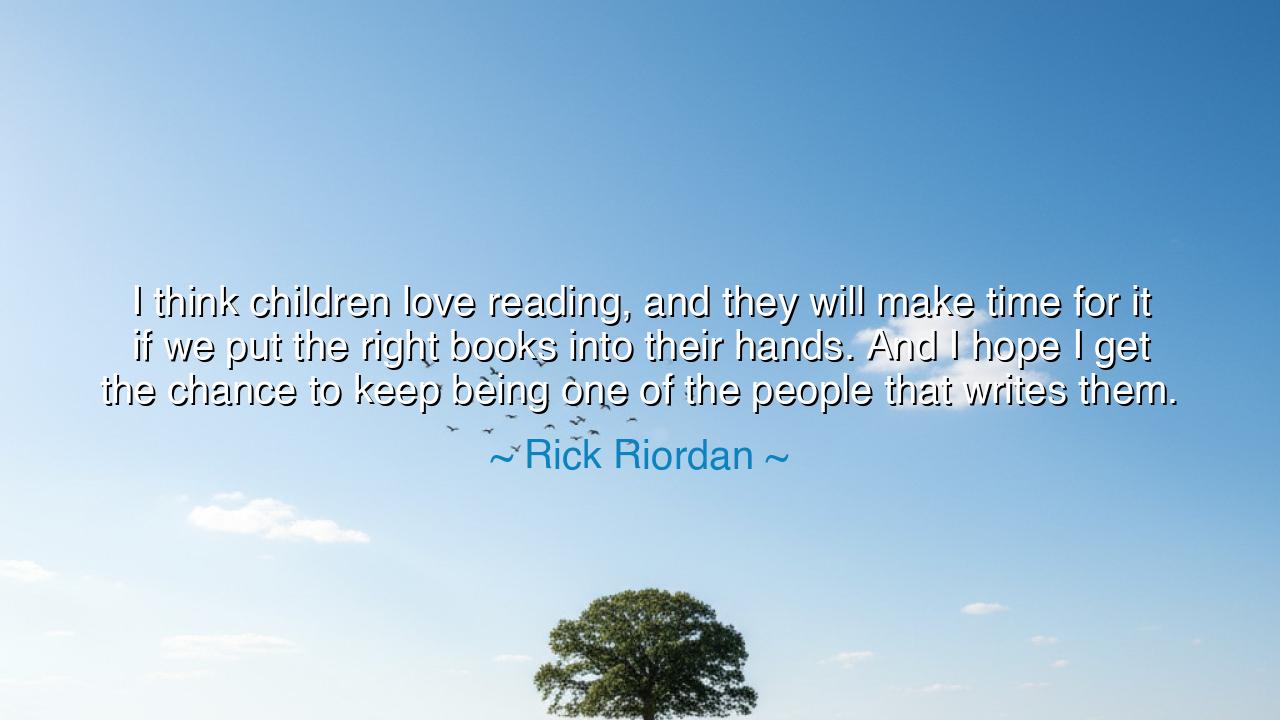
I think children love reading, and they will make time for it if
I think children love reading, and they will make time for it if we put the right books into their hands. And I hope I get the chance to keep being one of the people that writes them.






In the ancient world, the art of storytelling was held in the highest regard. It was through stories that wisdom was passed down, that cultures were preserved, and that the hearts of children were shaped. In his reflection, Rick Riordan captures the essence of this sacred tradition when he says, “I think children love reading, and they will make time for it if we put the right books into their hands. And I hope I get the chance to keep being one of the people that writes them.” These words are not just about the power of books—they speak to the very heart of what it means to cultivate imagination, curiosity, and a lifelong love for knowledge in the next generation.
The ancients understood that the minds of the young were like sponges, ready to absorb the lessons, the myths, and the teachings that would guide them into adulthood. In Homer’s Odyssey, for instance, the hero Odysseus is a man shaped by stories, by the words of his mentors, and by the myths that were passed down through the generations. He himself tells tales of heroes and gods, weaving them into the fabric of his journey. The gods, too, in the Greek myths, were often associated with the gift of storytelling—Apollo, the god of knowledge, was said to inspire both the poets and the musicians, the creators of stories. To the ancient mind, stories were not mere entertainment; they were the very tools that formed the minds and hearts of the young, teaching them not only facts but values, virtues, and the mysteries of the world around them.
Riordan’s belief in the power of books for children is a continuation of this age-old wisdom. Children, in their innocence and eagerness to understand the world, seek stories that speak to their sense of wonder and possibility. As Riordan so rightly says, they will make time for reading, but only if they are given the right books—books that ignite their imaginations, that call to their sense of adventure, and that resonate with the curiosity bubbling within them. It is not just the act of reading that matters, but the content—the stories that stir something deeper within the young soul, allowing them to dream and explore beyond the confines of their immediate world.
This is not a modern discovery. In the ancient world, Plato spoke of the importance of storytelling in the education of young minds. He recognized that the stories children heard would shape their understanding of virtue, truth, and the ideal world. He even suggested that the gods would guide the stories we tell, ensuring that the young minds would grow up with a sense of morality and purpose. Riordan, much like Plato, understands that books—especially those crafted for the young—serve as more than just entertainment; they are tools of transformation, capable of shaping the future through the lessons they impart.
Consider the story of Aesop, the ancient storyteller whose fables are still read today, thousands of years later. His simple tales of animals taught children the lessons of honesty, kindness, and wisdom, shaping the values of countless generations. Aesop’s Fables were not just stories—they were moral guides, teaching children the virtues that would lead them toward adulthood with a sense of responsibility and understanding. Like Aesop, Riordan believes that books are a pathway to something greater, a way to introduce children not only to the world of fantasy but to the deeper truths that lie beneath the surface of the stories.
In today’s world, we may find that children are surrounded by distractions—television, video games, and social media often compete for their attention. Yet, Riordan reminds us that children, if given the right books, will make time for reading. It is up to us, the creators, the writers, the storytellers, to offer them those books—books that spark their imagination, that challenge them, and that allow them to explore the vast worlds within the pages. Through these stories, children can travel far and wide, encountering characters and experiences that broaden their horizons and teach them lessons that will remain with them throughout their lives.
The lesson here is simple yet profound: stories are powerful. They are the tools that shape the minds of the young, molding them into the thinkers, leaders, and dreamers of tomorrow. Just as Riordan has dedicated his life to writing stories that inspire and ignite curiosity, we too have a role to play in nurturing the next generation of readers and thinkers. Whether we are writers, parents, educators, or simply lovers of stories, we must remember the power of the book in the hands of a child. By giving them the right books, we give them the gift of imagination, of growth, and of future possibilities. And in doing so, we fulfill the ancient calling to pass down the wisdom of the world, one story at a time.






AAdministratorAdministrator
Welcome, honored guests. Please leave a comment, we will respond soon